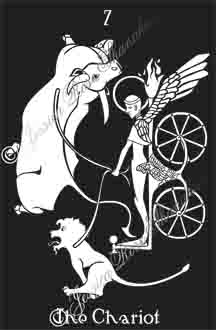
By means of will-power, self-assertion, control and determination, the charioteer drives his Chariot on a journey to victory. Any small slip in this control, any loss of direction, any show of overly-aggressive nature, and victory is lost. The eternal struggle to guide one’s own reigns— to control one’s own spirit— is what makes the self-driven strong. Be bold. Be confident. Have faith. Be the master of your spirited self.
This is the great journey: the journey of the spirit. This journey is the core focus of any religious faith. In Christian iconography, the evangelists Matthew, Mark, Luke and John are frequently represented by the angel, lion, ox and eagle, respectively. These symbols originate from the four living creatures that draw the Chariot of God in the vision described at length in the Book of Ezekiel (Chapter 1)* and described more succinctly in the Book of Revelation (4.6-9ff).** Neither source specifically links the creatures to the Evangelists.
The meanings attributed to the symbols grew over centuries, as meanings will, culminating in three layers of representation: (1) the Evangelists, (2) the nature of Christ, and (3) the virtues required for salvation, i.e.: the completion of the journey of the spirit. Although the symbols are from Christian mythology, the ideas they represent are universal and can be summarized thus:
- Matthew is symbolized by an angel. His gospel represents Christ’s human nature. It signifies that people should use reason for salvation.
- Mark is symbolized by a lion. His gospel represents the courageous and royal nature of Christ. It signifies that people should be courageous on the path of salvation.
- Luke is symbolized by a bull. His gospel represents Christ’s sacrifice, service and strength. It signifies that people should be prepared to sacrifice themselves in order to be saved.
- John is symbolized by an eagle, believed to be able to look straight into the sun. The eagle represents Christ’s Ascension and heavenly nature. It signifies that people should look into eternity without flinching as they journey towards their goal of union with God.
In The Chariot of the Absurd, two beasts pull God’s flaming throne, one beast rides it, one beast is part of it’s structure, and the wheels have eyes all around. Where is God in all of this? Why, everywhere, of course: God is one name for the journey itself.
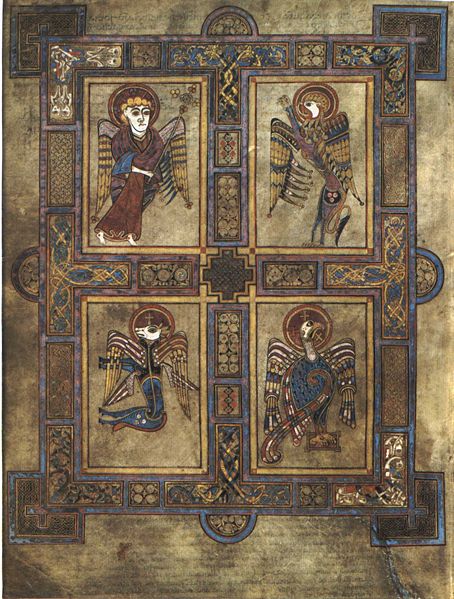
*An excerpt from Ezekiel:
…as I was among the exiles by the river Chebar,
the heavens were opened, and I saw visions of God…
As I looked, behold, a stormy wind came out of the north,
and a great cloud, with brightness round about it,
and fire flashing forth continually…
And from the midst of it came the likeness of four living creatures.
And this was their appearance:
they had the form of men, but each had four faces, and each of them had four wings.
Their legs were straight, and the soles of their feet were like the sole of a calf’s foot;
and they sparkled like burnished bronze.
Under their wings on their four sides they had human hands.
And the four had their faces and their wings thus:
their wings touched one another…
As for the likeness of their faces,
each had the face of a man in the front;
the four had the face of a lion on the right side,
the four had the face of an ox on the left side,
and the four had the face of an eagle at the back.
Such were their faces.
And their wings were spread out above;
each creature had two wings, each of which touched the wing of another, while two covered their bodies…
In the midst of the living creatures there was something that looked like burning coals of fire,
…and the fire was bright, and out of the fire went forth lightning.
And the living creatures darted to and fro, like a flash of lightning.
…I saw a wheel upon the earth beside the living creatures,
one for each of the four of them.
As for the appearance of the wheels and their construction:
their appearance was like the gleaming of a chrysolite;
…their construction being as it were a wheel within a wheel…
The four wheels had rims and they had spokes;
and their rims were full of eyes round about.
And when the living creatures went beside them;
and when the living creatures rose from the earth, the wheels rose.
Wherever the spirit would go they went, and the wheels rose along with them;
for the spirit of the living creatures was in the wheels.
**An excerpt from Revelation:
At once I was in the Spirit, and lo,
a throne stood in heaven, with one seated on the throne! …
And around the throne, on each side of the throne,
are four living creatures, full of eyes in front and behind:
the first living creature like a lion,
the second living creature like an ox,
the third living creature with the face of a man,
and the fourth living creature like a flying eagle.
And the four living creatures, each of them with six wings,
are full of eyes around and within,
and day and night they never cease to sing,
“Holy, holy, holy, is the Lord God Almighty, who was and is and is to come!”
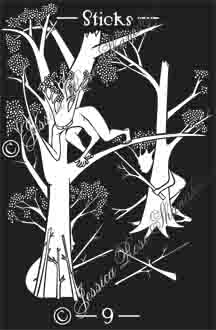
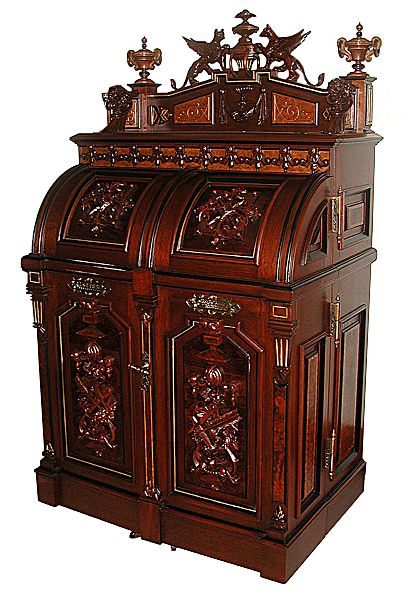 I have dreams that I find a desk—
I have dreams that I find a desk—



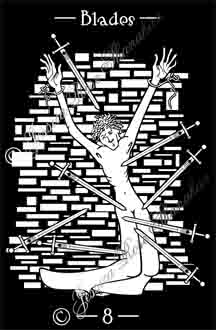
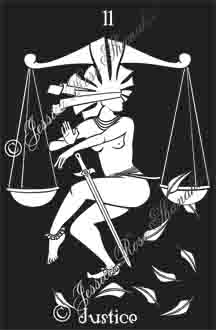


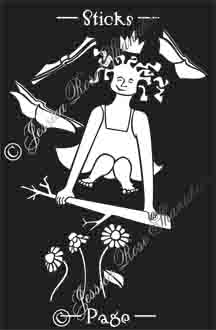
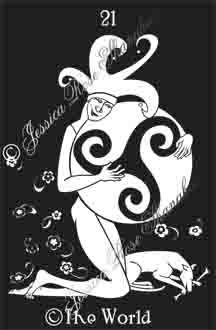
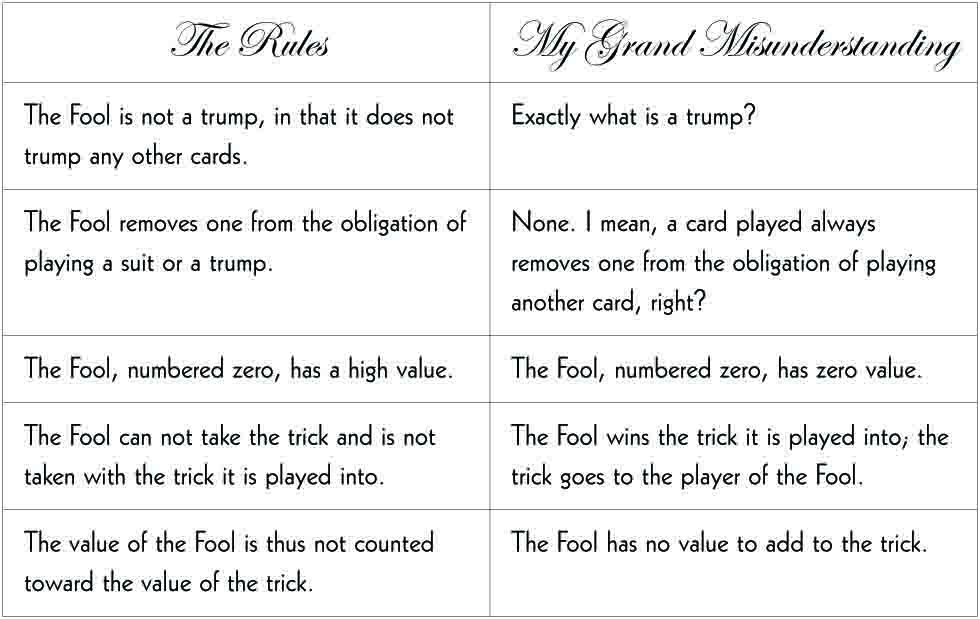
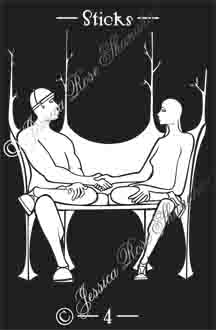
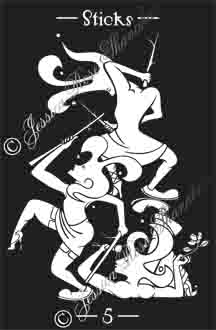 Fives represent conflict and change. They were some of the most difficult cards for me to illustrate. Nearing the end of my deck illustration project (only two more years to go!), I was left with all four Fives (Five of Sticks needed to be highly revised), four Kings, four Knights, the Seven of Coins, the Eight of Blades, Seven of Sticks, the Two of Sticks, the Three of Blades and Judgment, with the Eight of Cups requiring some major revision.
Fives represent conflict and change. They were some of the most difficult cards for me to illustrate. Nearing the end of my deck illustration project (only two more years to go!), I was left with all four Fives (Five of Sticks needed to be highly revised), four Kings, four Knights, the Seven of Coins, the Eight of Blades, Seven of Sticks, the Two of Sticks, the Three of Blades and Judgment, with the Eight of Cups requiring some major revision.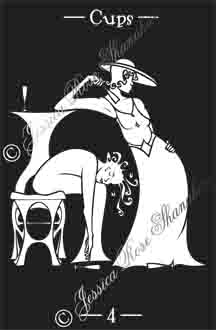 When I first began illustrating this deck, I had no overall knowledge of the tarot deck. The cards seemed to all have random and varied meanings. I searched through one deck after another looking for cohesiveness. I couldn’t always see how the meaning of the card was depicted in the image, and many of the images within a single deck seemed incredibly similar. I was ignorant, of course. Sometimes wonderful new things come of ignorance. Other times, experienced people are just confused by the ignorance of others. I hope my deck contains more images which evoke the former sentiment (wonder) rather than the later (confusion).
When I first began illustrating this deck, I had no overall knowledge of the tarot deck. The cards seemed to all have random and varied meanings. I searched through one deck after another looking for cohesiveness. I couldn’t always see how the meaning of the card was depicted in the image, and many of the images within a single deck seemed incredibly similar. I was ignorant, of course. Sometimes wonderful new things come of ignorance. Other times, experienced people are just confused by the ignorance of others. I hope my deck contains more images which evoke the former sentiment (wonder) rather than the later (confusion).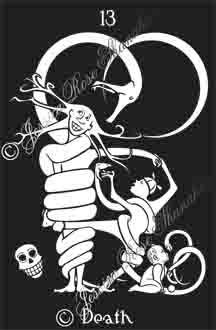 This was one of the earlier cards I illustrated.
This was one of the earlier cards I illustrated.